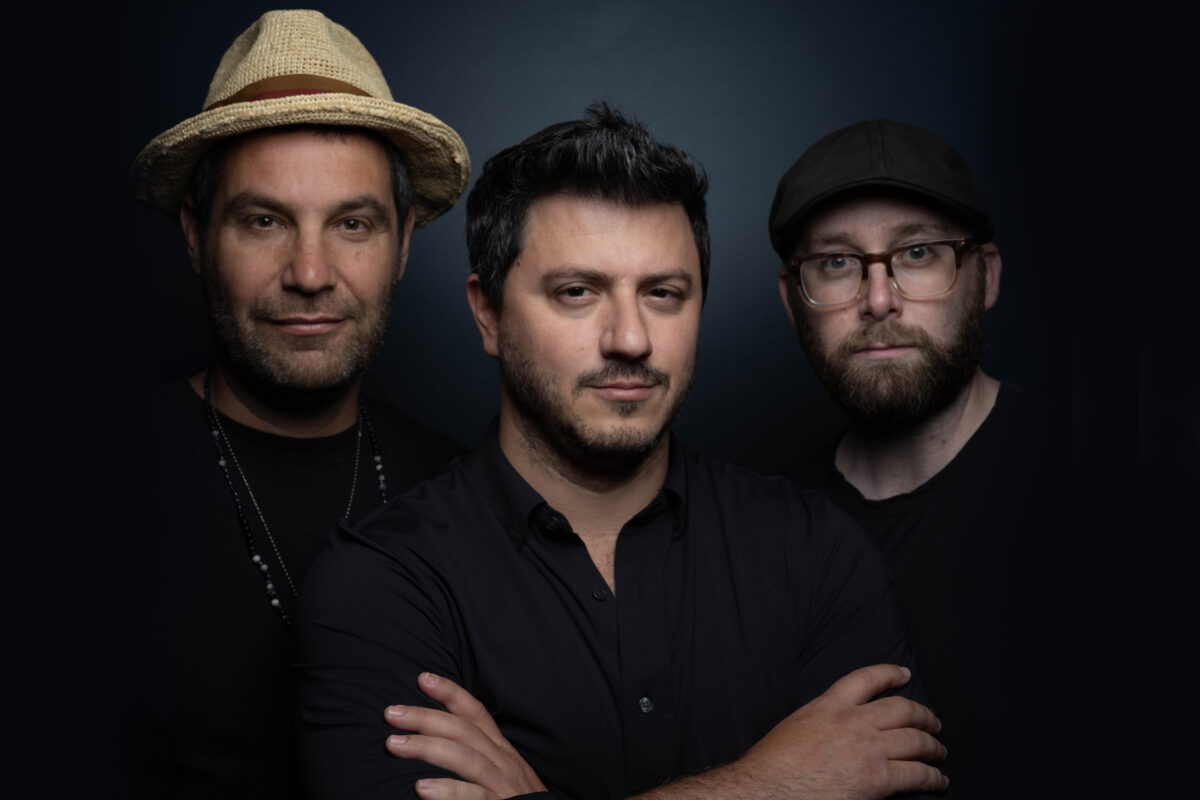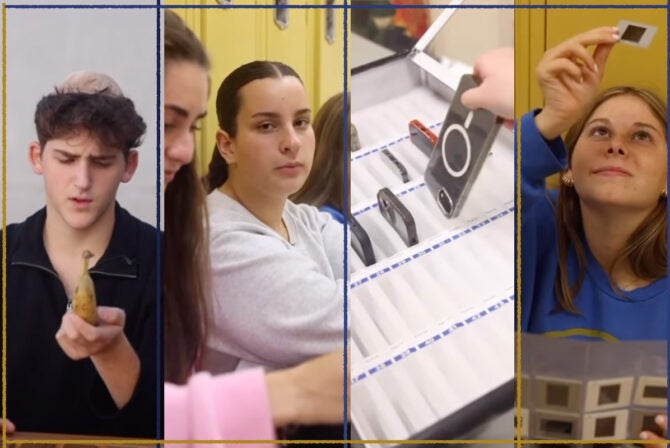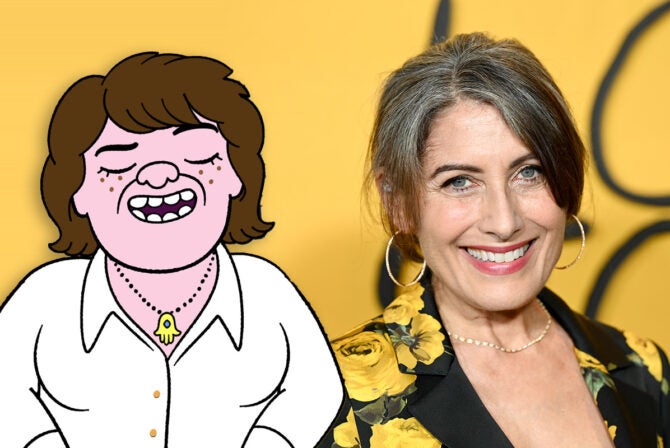On October 7, musician Duvid Swirsky, one third of the band Distant Cousins, came back home from a joyful Simchat Torah celebration he was leading in Echo Park, Los Angeles, when his wife told him, “I think you have to turn your phone on. Something’s happening in Israel.”
Across the country, his Distant Cousins bandmate Dov Rosenblatt was celebrating Simchat Torah, too, leading services as the cantor at a local Modern Orthodox synagogue in Nashville. More observant than Duvid, he didn’t turn on his phone until the end of the holiday, but when he asked his friend, the congregation’s bodyguard, how he was doing and saw this tough, resilient man break down in tears, he realized something big and awful had happened. The news slowly trickled into the holiday services, leaving the congregation unsure of how to celebrate a holiday that is so full of dancing and music and revelry.
As the holiday came to a close and Dov turned his phone back on, the full weight of the October 7 attack started to settle on him. He found himself, like so many of us, in need of great spiritual comfort. And, like so many of us again, he turned to music. He remembered Swirsky talked about putting words from Tehillim, or psalms, into music after dealing with a health issue. And so he sent him a text: “Can you please send me some of those ideas? I think I need them right now.”
The band’s new EP, “Out of the Darkness,” out today, are those thoughts, expanded and put to perfect folk music by the three members of Distant Cousins: Swirsky, based in LA, Rosenblatt, in Nashville, and Ami Kozak, in New Jersey. They’re as primal and needed now, almost a year after October 7, as they were needed by Rosenblatt on October 8. These five songs take you on an exalting journey, beginning with grieving in “Dim’ati” (“My Tear”), the EP’s only Hebrew track, with lyrics that beg for our prayers and our tears to be heard. It ends with a track, fully in English, that urges us to go into “The Unknown,” to be sober and present in the world, to “admit what you don’t know, and open the door into the unknown.” It’s a pathway urged by our Jewish tradition, and also wise guiding words in a modern world where so many are filled with certainties about what’s going on in the world, and where more listening and humbleness is needed.
You’ve probably heard Distant Cousins before, maybe playing in the background of a favorite TV show or kids program. They’ve written theme songs for DreamWorks Animation kids shows like “Where’s Waldo” and “Archibald’s Next Big Thing,” and composed the instrumental score for Netflix’s “Dew Drop Diaries.” Since they live in three different cities, they collaborate over Zoom and Dropbox. “It’s amazing what you can do nowadays,” Rosenblatt tells Kveller. “And we love it also because we all have young kids as well. I have five kids from the ages of 12 to 1. Ami has four kids. Duvid has two kids. So for ourselves, selfishly, it’s really fun for our kids to be able to watch these shows and be like, ‘Oh, our dads did the music!'”
Before they played together, each bandmate had their own journey with music. Swirsky co-founded a Jewish band called Moshav way back in 1996, and Rosenblatt has been in the Jewish rock band Blue Fringe. The two met while playing shows together. “From our first meeting, we felt like kindred spirits,” Swirsky says, and they knew they were going to work together. Swirsky met Kozak while Moshav was touring in New Jersey, and Kozak’s band opened for them; they were mutual fans.
The three musicians came together in 2013 to make music together as Distant Cousins. The band’s name, which came from Rosenblatt, alluded to the instant warm, familiar feeling they had with each other — it’s clear, talking to them over Zoom, how deeply each creator admires the other. The name is also about the spirit of their performances, in which they often bring to stage fellow Jewish musicians who live locally, filling the space in the vain of many of the bands that were popular when they first started like Edward Sharpe and the Magnetic Zeroes. “It came out of a fantasy of community building,” Swirsky says. “It feels like a full circle with ‘Out of the Darkness,” a return to the idea of community, but also, an even more primary return to our roots.”
The EP is Distant Cousin’s first explicitly Jewish EP. “We’re a band that never shied away from our Jewish identity, but it was sort of a fact,” Kozak explains. “It felt like post October 7, the only identity that really mattered, as everything else melted away, was our Jewish one.” And so they fully leaned into with “Out of the Darkness.”
Many of the songs’ lyrics incorporate lines from the Book of Psalms, whose words so many ailing Jews take comfort in during times of strife, and their singing and instrumentals breathe a special kind of spiritual life into them. Swirsky, who grew up on the music of Shlomo Carlebach at the Mevo Modi’in Moshav, remembered once being chided for getting the melody of one his songs wrong by a community elder. He explained to him, “You have all these great commentators in the Jewish tradition, like Rashi and the Rambam, and this is his commentary. The melody is this commentary. And if you get the melody wrong, you’re getting the commentary wrong.” That idea stuck with him. This EP is Distant Cousins’ commentary on some of the most evocative lines from Psalms.
But you don’t need to be an observant Jew or religious to feel its beauty. While so many of the lines from Psalms are about finding comfort in God, they also feel like love songs, odes to the people who act as our anchors. In “Me’ayin,” Rosenblatt elucidates that the famous line from “Song of Ascent” — “me’ayin yavo ezri” or “from where will my help come?” — has two possible interpretations for the answer: one is from within God, but that same word for “with” also spells the Hebrew word for “people.”
“After October 7, we were witnessing, from afar, what was happening in Israel. And also just all over the world, really. People connecting and coming together and stepping up and being there for each other, to comfort each other — that’s really what spurred that song,” he says.
The band knew that it was important for them to incorporate Hebrew into their songs for the first time. “In addition to the antisemitism post-October 7, you’re seeing this unique Israel shaming,” Kozak muses, and also what he sees as “Hebrew shaming.” He’s heard stories of students who are from Israel going through the campus of Columbia University and being sneered at just for speaking Hebrew. “We’re gonna sing in Hebrew, and we’re not gonna feel ashamed of it, and there’s not gonna be anything uncool about it. And it’s not gonna be hierarchical in the realm of music, that there’s Jewish music and then there’s, like, the real music? No, those barriers are gone for me. Any sort of these abstract, artificial labels and barriers we put on ourselves as to what we consider legitimate and cool and accepted and mainstream. I think for a lot of people, it’s hopefully a time where people can put that front and center without feeling like they have to be ashamed or compromised and sing in Hebrew proudly. The music transcends any language barrier.”
Fans will be able to hear the band from their musical pulpit all over the country this month as they’ll be touring with Matisyahu. The three musicians have often overlapped with the iconic Jewish reggae star. Moshav has performed with him, and Kozak collaborated with him more recently (and also had him on the first episode of his podcast). Over Passover, the band was performing in Florida, and knowing that Matisyahu was there, they asked him to come on stage to do a song with them. The “One Day” singer surprised them by saying that he wanted to come on for more than one song, and stayed for a few as the band backed him up. The next day, Matisyahu asked Rosenblatt’s wife if she’d be OK with them joining him on tour. “It was a no-brainer,” he says. “All three of us have been been big fans of his in the past, and I think especially right now, he’s really shown so much courage to just be who he is proudly and continue with his touring, even when people are protesting. We’re really, really excited for the opportunity to join him in that realm, and for ourselves, of course, as a band, to be in front of much larger audiences than we have been.”
To Swirsky, the album is an embodiment of Jewish tradition, which he sees as a kind of vessel where “you can pour anything through it. And really, what comes out is creativity. More than anything, what comes out is expression.” He recalls a recent visit with his family to Ellis Island, where many of his ancestors came through. “What moved me more than anything was you go through all these rooms and you see the great difficulty and struggle of our people — and then in the end, there’s a room with all these posters for theater and comedy and music in Yiddish… These people got off the boat from all this trouble, and overnight, there was this burst of creativity. It was so beautiful. I was like, look, this is what we do. This is what our tradition does. It converts struggle into creativity.”
“There’s a line in one of the songs: ‘Let it be a healing.’ And we feel like ‘Out of the Darkness’ is a celebration of how we cope,” Kozak adds. “We make things, we make beautiful things, and we celebrate and sing them together.”
“While we want to the whole world to love this album, and hope they do,” he continues, “we’re going deep, not wide, as far as the reach. The niche here is ‘this is for us, by us.'”
Rosenblatt got to see for himself how powerful these songs really are. He was sitting at a table one night with some friends who were visiting Nashville. One of them was Israeli, from Ashkelon. He played a voice memo of part of a song, what would become one of my personal favorite tracks on the album, “Without Warning,” and just at the sound of that first verse, he says, “all of us at the table were in tears. It was just really, really powerful, beautiful and comforting.” The song features a refrain of the line from Psalms in Hebrew: “I stretch my hands out to You. My soul turns to You like a weary land.”
So many of us are still stuck in the days after that Simchat Torah of 2023. And in a way, “Out of the Darkness” answers the same question Rosenblatt and his congregation asked during that holiday celebration: How do we keep celebrating our tradition amidst all this grief? The answer was there all along, in the ancient words from Psalms, in the Jewish tradition of turning pain into art. And it is distilled, magnificently bare, touching and honest, in this EP.
“Out of the Darkness” is now streaming wherever you find your music. Distant Cousins are touring with Matisyahu this month, and you can find the tour dates here.








